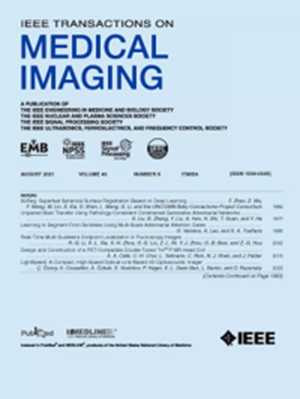Pseudo-Data based Self-Supervised Federated Learning for Classification of Histopathological Images
IF 8.9
1区 医学
Q1 COMPUTER SCIENCE, INTERDISCIPLINARY APPLICATIONS
引用次数: 1
Abstract
Computer-aided diagnosis (CAD) can help pathologists improve diagnostic accuracy together with consistency and repeatability for cancers. However, the CAD models trained with the histopathological images only from a single center (hospital) generally suffer from the generalization problem due to the straining inconsistencies among different centers. In this work, we propose a pseudo-data based self-supervised federated learning (FL) framework, named SSL-FT-BT, to improve both the diagnostic accuracy and generalization of CAD models. Specifically, the pseudo histopathological images are generated from each center, which contain both inherent and specific properties corresponding to the real images in this center, but do not include the privacy information. These pseudo images are then shared in the central server for self-supervised learning (SSL) to pre-train the backbone of global mode. A multi-task SSL is then designed to effectively learn both the center-specific information and common inherent representation according to the data characteristics. Moreover, a novel Barlow Twins based FL (FL-BT) algorithm is proposed to improve the local training for the CAD models in each center by conducting model contrastive learning, which benefits the optimization of the global model in the FL procedure. The experimental results on four public histopathological image datasets indicate the effectiveness of the proposed SSL-FL-BT on both diagnostic accuracy and generalization.基于伪数据的组织病理图像分类自监督联邦学习
计算机辅助诊断(CAD)可以帮助病理学家提高癌症诊断的准确性以及一致性和可重复性。然而,仅使用来自单一中心(医院)的组织病理图像训练的CAD模型通常由于不同中心之间的张力不一致而存在泛化问题。在这项工作中,我们提出了一个基于伪数据的自监督联邦学习(FL)框架,命名为SSL-FT-BT,以提高CAD模型的诊断准确性和泛化。具体来说,从每个中心生成伪组织病理图像,这些图像包含该中心真实图像的固有属性和特定属性,但不包含隐私信息。然后,这些伪图像在中央服务器中共享,用于自监督学习(SSL),以预训练全局模式的主干。然后设计多任务SSL,根据数据特征有效地学习特定于中心的信息和常见的固有表示。在此基础上,提出了一种基于Barlow Twins (FL- bt)算法,通过模型对比学习来改进各中心CAD模型的局部训练,有利于FL过程中全局模型的优化。在四个公共组织病理学图像数据集上的实验结果表明,所提出的SSL-FL-BT在诊断准确性和泛化方面都是有效的。
本文章由计算机程序翻译,如有差异,请以英文原文为准。
求助全文
约1分钟内获得全文
求助全文
来源期刊

IEEE Transactions on Medical Imaging
医学-成像科学与照相技术
CiteScore
21.80
自引率
5.70%
发文量
637
审稿时长
5.6 months
期刊介绍:
The IEEE Transactions on Medical Imaging (T-MI) is a journal that welcomes the submission of manuscripts focusing on various aspects of medical imaging. The journal encourages the exploration of body structure, morphology, and function through different imaging techniques, including ultrasound, X-rays, magnetic resonance, radionuclides, microwaves, and optical methods. It also promotes contributions related to cell and molecular imaging, as well as all forms of microscopy.
T-MI publishes original research papers that cover a wide range of topics, including but not limited to novel acquisition techniques, medical image processing and analysis, visualization and performance, pattern recognition, machine learning, and other related methods. The journal particularly encourages highly technical studies that offer new perspectives. By emphasizing the unification of medicine, biology, and imaging, T-MI seeks to bridge the gap between instrumentation, hardware, software, mathematics, physics, biology, and medicine by introducing new analysis methods.
While the journal welcomes strong application papers that describe novel methods, it directs papers that focus solely on important applications using medically adopted or well-established methods without significant innovation in methodology to other journals. T-MI is indexed in Pubmed® and Medline®, which are products of the United States National Library of Medicine.
 求助内容:
求助内容: 应助结果提醒方式:
应助结果提醒方式:


